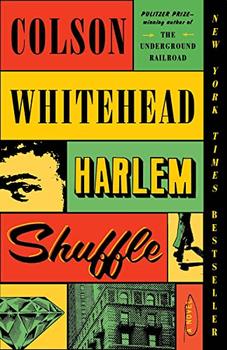Summary | Excerpt | Reading Guide | Reviews | Beyond the Book | Readalikes | Genres & Themes | Author Bio

CHAPTER ONE
His cousin Freddie brought him on the heist one hot night in early June. Ray Carney was having one of his run-around days—uptown, downtown, zipping across the city. Keeping the machine humming. First up was Radio Row, to unload the final three consoles, two RCAs and a Magnavox, and pick up the TV he left. He'd given up on the radios, hadn't sold one in a year and a half no matter how much he marked them down and begged. Now they took up space in the basement that he needed for the new recliners coming in from Argent next week and whatever he picked up from the dead lady's apartment that afternoon. The radios were top-of-the-line three years ago; now padded blankets hid their slick mahogany cabinets, fastened by leather straps to the truck bed. The pickup bounced in the unholy rut of the West Side Highway.
Just that morning there was another article in the Tribune about the city tearing down the elevated highway. Narrow and indifferently cobblestoned, the road was a botch from the start. On the best days it was bumper-to-bumper, a bitter argument of honks and curses, and on rainy days the potholes were treacherous lagoons, one grim slosh. Last week a customer wandered into the store with his head wrapped like a mummy—beaned by a chunk of falling balustrade while walking under the damn thing. Said he was going to sue. Carney said, "You're in your rights." Around Twenty-Third Street the pickup's wheels bit into a crater and he thought one of the RCAs was going to launch from the bed into the Hudson River. He was relieved when he was able to sneak off at Duane Street without incident.
Carney's man on Radio Row was halfway down Cortlandt, off Greenwich, right in the thick. He got a space outside Samuel's Amazing Radio—repair all makes—and went to check that Aronowitz was in. Twice in the last year he'd come all the way down to find the shop shut in the middle of the day.
A few years ago, walking past the crammed storefronts was like twirling a radio dial—this store blared jazz into the street out of horn loudspeakers, the next store German symphonies, then ragtime, and so on. S & S Electronics, Landy's Top Notch, Steinway the Radio King. Now he was more likely to hear rock and roll, in a desperate lure of the teenage scene, and to find the windows crammed with television sets, the latest wonders from DuMont and Motorola and the rest. Consoles in blond hardwood, the sleek new portable lines, and three-in-one hi-fi combos with picture tube, tuner, and turntable in the same cabinet, smart. What hadn't changed was Carney's meandering sidewalk route around the massive bins and buckets of vacuum tubes, audio transformers, and condensers that drew in tinkerers from all over the tri-state. Any part you need, all makes, all models, reasonable prices.
There was a hole in the air where the Ninth Avenue el used to run. That disappeared thing. His father had taken him here once or twice on one of his mysterious errands, when he was little. Carney still thought he heard the train sometimes, rumbling behind the music and haggling of the street.
Aronowitz hunched over the glass counter, with a loupe screwed into his eye socket, poking one of his gizmos. "Mr. Carney." He coughed.
There weren't many white men who called him mister. Downtown, anyway. The first time Carney came to the Row on business, the white clerks pretended not to see him, attending to hobbyists who came in after him. He cleared his throat, he gestured, and remained a black ghost, store after store, accumulating the standard humiliations, until he climbed the black iron steps to Aronowitz & Sons and the proprietor asked, "Can I help you, sir?" Can I help you as in Can I help you? As opposed to What are you doing here? Ray Carney, in his years, had a handle on the variations.
That first day, Carney told him he had a radio in need of repair; he had just picked up his sideline in gently used appliances. Aronowitz cut him off when he tried to explain the problem and got to work unscrewing the case. Carney didn't waste his breath on subsequent visits, merely set the radios before the maestro and let him have his way with it. The routine went: weary sighs and grunts as he surveyed the problem, with a jab and flash of silver implements. His Diagnometer tested fuses, resistors; he calibrated voltage, rummaged through unlabeled trays in the steel filing cabinets along the walls of the gloomy shop. If something big was afoot, Aronowitz twirled in his chair and scurried into the workshop in the back, to more grunts. He reminded Carney of a squirrel in the park, darting helter-skelter after lost nuts. Maybe the other squirrels of Radio Row understood this behavior, but it was animal madness to this civilian.
Excerpted from Harlem Shuffle by Colson Whitehead. Copyright © 2021 by Colson Whitehead. Excerpted by permission of Doubleday. All rights reserved. No part of this excerpt may be reproduced or reprinted without permission in writing from the publisher.
Judge a man by his questions rather than by his answers.
Click Here to find out who said this, as well as discovering other famous literary quotes!
Your guide toexceptional books
BookBrowse seeks out and recommends the best in contemporary fiction and nonfiction—books that not only engage and entertain but also deepen our understanding of ourselves and the world around us.